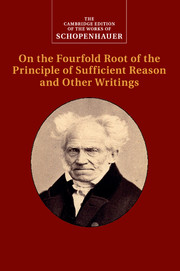Book contents
- Frontmatter
- Contents
- General Editor’s Preface
- Editorial Notes and References
- Introduction
- Notes on Text and Translation
- Chronology
- Bibliography
- Collation of the Two Editions of On the Fourfold Root
- 1 On the Fourfold Root of the Principle of Sufficient Reason
- 2 On Vision and Colours
- 3 On Will in Nature
- Glossary of Names
- Index
Conclusion
Published online by Cambridge University Press: 30 June 2022
- Frontmatter
- Contents
- General Editor’s Preface
- Editorial Notes and References
- Introduction
- Notes on Text and Translation
- Chronology
- Bibliography
- Collation of the Two Editions of On the Fourfold Root
- 1 On the Fourfold Root of the Principle of Sufficient Reason
- 2 On Vision and Colours
- 3 On Will in Nature
- Glossary of Names
- Index
Summary
The surely striking corroborations of my theory enumerated in this treatise that have been provided by the empirical sciences since its appearance, but independently of it, are without a doubt joined by still many others that have not come to my knowledge. For how small is the portion of the literature of the natural sciences, carried on so actively in all languages, that the individual has sufficient time, opportunity, and patience to become familiar with. But what has been communicated here already givesme the assurance that the time of my philosophy is ripening, and with heartening joy I see how, over the course of years, the empirical sciences gradually appear as unquestionable witnesses for a theory about which the ‘philosophers by profession’ (some of them naïvely give themselves this characteristic name, and even that of the ‘philosophical trade’) have for seventeen years observed a politic and inviolable silence, having left it to Jean-Paul,, who is uninitiated in their politics, to speak about it. For it may have seemed risky to praise my philosophy, but upon more careful consideration, not all that safe to censure it, and it might have appeared unnecessary to make the public (which is not ‘of the profession and trade’) realize that one could seriously philosophize without being either unintelligible or boring; thus, why should they have to compromise themselves with it, since certainly no one betrays himself by silence, and the preferred method of secrecy was at hand, as the approved means against the meritorious, and just enough was agreed upon that under the circumstances of that time my philosophy did not properly qualify to be taught from the lectern, which was after all the true and ultimate purpose of all philosophy, according to their heartfelt opinion – all this was so much and so certain, that if the stark naked Truth came down from lofty Olympus, yet whatever she brought were found not to be consistent with the requirements called for by the circumstances of the time or with the purposes of high-ranking superiors, the gentlemen ‘of the profession and the trade’ would waste no time with this indecent nymph, but would hurry her back to her Olympus with their compliments, then put three fingers on their lips and return undisturbed to their compendia.
Information
- Type
- Chapter
- Information
- Schopenhauer: On the Fourfold Root of the Principle of Sufficient Reason and Other Writings , pp. 447 - 448Publisher: Cambridge University PressPrint publication year: 2012
